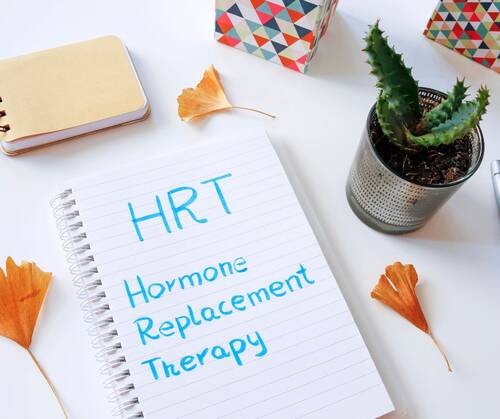
16 Dec Understanding Hormone Therapy Replacement: Benefits and Considerations for Age Management
Hormone replacement therapy (HRT) is a treatment method that helps people with symptoms of menopause. This medication is taken to replace the estrogen that your body stops producing during menopause.
Once your hormone levels rise, you may find relief from your symptoms. Hormone therapy also prevents osteoporosis and reduces the risk of fracture in postmenopausal women. To know whether you should consider taking HRT is a decision that you need to discuss with your healthcare provider.

There may be risks associated with using types of hormone therapy. These risks depend on the type of HRT, the dosage, and how long it is taken. Hormone replacement therapy should be designed for each person to ensure the benefits outweigh the risks.
What are the Symptoms of Menopause?
Menopause is a natural transition in a woman’s life, marking the end of menstrual cycles. This phase is primarily caused by a decline in estrogen that your body naturally produces. While this transition is a normal part of aging, the symptoms of menopause can be challenging for many women.
Common menopausal symptoms include:
- Hot Flashes and Night Sweats: Moderate to severe hot flashes are one of the most common symptoms, causing sudden feelings of heat, flushing, and perspiration. These episodes can disrupt daily life and sleep, often occurring alongside night sweats.
- Vaginal Dryness and Painful Intercourse: Estrogen deficiency leads to thinning of vaginal tissues, causing discomfort, dryness, and painful intercourse. Low dose vaginal preparations, such as a vaginal cream, tablet, or ring, are often used to treat these symptoms.
- Bone Thinning Disease Called Osteoporosis: Estrogen plays a critical role in maintaining bone density. Without adequate levels, postmenopausal women face an increased risk of osteoporosis, which can result in bone loss or fractures.
- Mood Swings and Cognitive Changes: Declining female hormones can contribute to mood swings, irritability, and difficulties with concentration or memory.
- Sleep Disturbances: Hot flashes and night sweats often disrupt sleep, leading to insomnia and fatigue.
- Heart Disease and High Blood Pressure: Estrogen deficiency can raise the risk of heart disease and high blood pressure over time.
- Thinning Hair and Dry Skin: Reduced hormone levels affect skin elasticity and hair health, leading to dryness and thinning.
- Weight Gain: Changes in metabolism during menopause often result in weight gain, especially around the abdomen.
- Urinary Symptoms: Estrogen deficiency can weaken the urinary tract, increasing the risk of urinary tract infections or incontinence.
- Loss of Libido: Hormonal changes often reduce sexual desire or cause discomfort during intimacy.
How Can Hormone Therapy Can be Used to Treat Menopausal Symptoms
While these symptoms are common, they can significantly impact quality of life. Hormone replacement therapy (HRT), which primarily focuses on restoring female hormones like estrogen, is routinely used to treat menopausal symptoms and protect long-term health. Systemic hormone therapy—delivered through a pill, patch, gel, or spray form—can effectively address hot flashes, night sweats, and bone loss.
For vaginal-specific issues, low dose vaginal products such as a vaginal cream, tablet, or ring are targeted options that can alleviate dryness and discomfort with minimal systemic absorption.
It’s important to note that while clinical trials showed health benefits of HRT, large trials showed health risks, including an increased risk of breast cancer, endometrial cancer, blood clots, stroke, and liver disease. However, for many women, the benefits of hormone therapy outweigh the risks, particularly for those experiencing early menopause or troublesome menopausal hot flashes.
The bottom line: hormone therapy can be a valuable solution to treat common menopausal symptoms, improve quality of life, and protect long-term health. However, the choice to take hormone therapy depends on your personal medical history, health risks, and individual needs. A consultation with your healthcare provider can determine the best product and delivery method, whether it’s systemic therapy, skin patch, ring, gel, or low dose vaginal cream tablet. Pairing HRT with a healthy diet and lifestyle can further support your well-being during menopause.
Basic Types of Hormone Replacement Therapy (HRT)
Types of hormone replacement therapy are estrogen therapy and combination therapy. You can discuss which type works best for you with your healthcare provider. They will recommend an option based on your symptoms and medical history.
1.) Estrogen Therapy
Estrogen therapy involves taking estrogen only. Your doctor may prescribe a low estrogen dose at the beginning. Forms of estrogen include:
- Pills to be swallowed orally
- A patch to stick on your skin
- A gel to apply on your skin
- A spray to apply to your arm
- A ring to wear in your vaginal area
- A cream that should be applied to your vaginal area
- Tablets to insert in your vaginal area
For those who have had a hysterectomy, your provider may recommend estrogen-only therapy. This is because it has fewer long-term effects.
2.) Combination Therapy (Estrogen-Progesterone Therapy)
This form of hormone therapy combines doses of estrogen and progesterone, also known as progestin. Progestins help in reducing the risk of uterine cancer in patients, which is higher when you take estrogen only. During your reproductive years, your uterus sheds its lining during menstruation. When menstruation stops, estrogen can cause an overgrowth of cells, which can lead to cancer.
Combination therapy comes in a pill or skin patch. It can also come in an intrauterine device that your doctor places in your vaginal area.
Ways to Take HRT
There are two ways to describe how to take hormone therapy: Systemic and local.
Systemic Hormonal Therapy
Systemic therapy means the medication gets into your bloodstream and travels to other organs and tissues. Systemic types include pills, patches, sprays, and gels. They work for hot flashes, night sweats, and other menopause symptoms.
Local Hormone Therapy
Local therapy means applying the product to a specific area. These include vaginal cream or tablets. These are especially helpful for symptoms such as vaginal dryness. Local therapy comes in lower dosages.
How Hormone Replacement Therapy Works
As women approach menopause, their ovaries begin to shrink and stop producing estrogen and progesterone. Lack of enough of these hormones in the body causes menopausal symptoms. Hormone replacement therapy works by replenishing these lost hormones. For more information about the role of hormone therapy, visit med spa Boca Raton.
How Often Should You Take Hormone Replacement Therapy?
Treatment starts with the lowest effective dose, that is, the lowest dose that relieves your symptoms. People who lose estrogen too early are given higher doses to replace what their ovaries should produce at their age.
Estrogen-only therapy is taken on a daily basis. How you apply it depends on which product you are using. For combined therapy, you can take it as either continuous-combined or cyclic therapy. In continuous-combined therapy, you will take both estrogen and progesterone daily in the form that works for you.
However, in cyclic therapy, you can take estrogen daily and progesterone for 23 to 15 days each month. Since it is taken for a short time, the most common way to take progesterone is by swallowing pills.
Benefits of Taking Hormone Replacement Therapy
One of the main benefits of HRT is relieving menopausal symptoms. This can improve your quality of life and allow you to enjoy your hobbies.

HRT helps with:
- Vaginal dryness or painful intercourse
- Moderate to severe hot flashes
- Reducing the risk of fractures
- Improving your sleep
- Improving your mood
- Reducing your risk of diabetes
- Estrogen deficiency
When symptoms of menopause are managed, women are able to focus on their overall well-being.
Things to Consider Before Starting Hormone Therapy Replacement
There are several things you need to consider before you start your hormone therapy. These include:
The Risks of Hormone Therapy
Hormone replacement therapy may be helpful during menopause, but it may come with possible health risks like:
- Risk of uterine cancer
- Heart disease
- Blood clots and stroke
- Liver disease
- Endometrial cancer
- Risk of gallbladder disease
- Breast cancer
It is important to discuss your health condition with your doctor to lower these risks and find the best HRT type for you.
Personal Medical History
When determining what type of hormone replacement therapy will work for you, your medical history will play a huge role. Your medical health provider will create your unique treatment plan for the best results.
Side Effects of Hormone Replacement Therapy
The most common HRT side effects are:

- Breast tenderness
- Mood swings
- Irregular vaginal bleeding
- Bloating
- Headaches
- Skin irritation under estrogen patches
These side effects usually go away on their own after a few months and are usually mild. If your symptoms persist, contact your health provider.
How to Reduce Risks When Taking Hormone Replacement Therapy
Here is how you can reduce the health risks of HRT:
1.) Find a Delivery Method That Works for You
You can take estrogen in the form of pills, patches, gel, or vaginal cream. If you experience only vaginal symptoms during menopause, estrogen in a low-dose vaginal cream can work for you.
2.) Minimize the Amount of Medication You Take
You can use the lowest effective dose for the shortest amount of time needed to ease your symptoms. If you are younger than 40, you need enough estrogen to avoid estrogen deficiency.
3.) Go for Regular Check-ups
Visit your doctor regularly to make sure that the advantages of hormone replacement therapy are more than the risks. Your doctor will screen and conduct pelvic exams on you.
4.) Make Healthy Life Choices
Exercise regularly and eat a healthy diet. Learn healthy ways to manage stress and any chronic illness you may have.
How Long Should You Take Hormone Replacement Therapy?
Most people take HRT for five years or less. There is no specific time limit. It can vary depending on your symptoms and the type of HRT you take.
How Different Types of Hormone Therapy Can Be Used in Anti-Aging
Hormone replacement therapy has made the lives of many women going through menopause better by offering relief to their symptoms. That is why estrogen benefits for females cannot be overlooked. However, it is essential to consult your doctor before beginning treatment.
Partner with a knowledgeable healthcare provider who will create a personalized treatment plan. Understand your options and take into account your medical history before making any decision.
More information:
———————-
The information on MedicalResearch.com is provided for educational purposes only, and is in no way intended to diagnose, cure, or treat any medical or other condition.
Some links are sponsored. Products are not warranted or endorsed.
Always seek the advice of your physician or other qualified health and ask your doctor any questions you may have regarding a medical condition. In addition to all other limitations and disclaimers in this agreement, service provider and its third party providers disclaim any liability or loss in connection with the content provided on this website.
Last Updated on December 16, 2024 by Marie Benz MD FAAD
